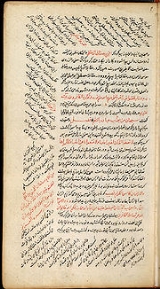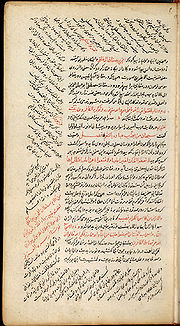
Fihi Ma Fihi
Encyclopedia

Persian language
Persian is an Iranian language within the Indo-Iranian branch of the Indo-European languages. It is primarily spoken in Iran, Afghanistan, Tajikistan and countries which historically came under Persian influence...
prose work of the 13th century Sufi
Sufism
Sufism or ' is defined by its adherents as the inner, mystical dimension of Islam. A practitioner of this tradition is generally known as a '...
writer Mewlānā Jalāl ad-Dīn Muḥammad Balkhī. The book consists of 72 short discourses.
The title and origin of the book
According to J. M. SadeghiJaafar Modarres-Sadeghi
Jaafar Modarres-Sadeghi is an Iranian novelist and editor.Modarres-Sadeghi was born in Isfahan and moved to Tehran in 1972. While he was studying in the College of Literature and Foreign Languages in Tehran, he began to work as a journalist in a few dailies and literary magazines, writing reports,...
the title "Fihi ma fihi" has appeared on a copy dated 1316. Another copy of the book dated 1350 has the title "Asrar al-jalalieh". Rumi himself in the fifth volume of Masnavi-i Ma'navi
Masnavi
The Masnavi, Masnavi-I Ma'navi or Mesnevi , also written Mathnawi, Ma'navi, or Mathnavi, is an extensive poem written in Persian by Jalal al-Din Muhammad Rumi, the celebrated Persian Sufi saint and poet. It is one of the best known and most influential works of both Sufism and Persian literature...
mentions that
which most likely refers to this book. The title "Maghalat-e Mowlana" of copies of the book published in Iran follows this.
Not much is known about the publication time and the writer of the book. According to B. Forouzanfar, the editor of the most reliable copy of the book, it is likely that the book was written by Sultanwalad
Sultan Walad
Baha al-Din Muhammad-i Walad , more popularly known as Sultan Walad , was the eldest son of Jalal Al-Din Rumi, Persian poet and Sufi, and one of the founders of the Mawlawiya order.-Life and Impact:...
, the eldest son of Rumi, based on manuscripts and notes taken by himself or others from the lectures of his father on Masnavi-i Ma'navi
Masnavi
The Masnavi, Masnavi-I Ma'navi or Mesnevi , also written Mathnawi, Ma'navi, or Mathnavi, is an extensive poem written in Persian by Jalal al-Din Muhammad Rumi, the celebrated Persian Sufi saint and poet. It is one of the best known and most influential works of both Sufism and Persian literature...
.
Significance
The significance of this work is in being one of the first PersianPersian language
Persian is an Iranian language within the Indo-Iranian branch of the Indo-European languages. It is primarily spoken in Iran, Afghanistan, Tajikistan and countries which historically came under Persian influence...
prose books after the so called Persian literature
Persian literature
Persian literature spans two-and-a-half millennia, though much of the pre-Islamic material has been lost. Its sources have been within historical Persia including present-day Iran as well as regions of Central Asia where the Persian language has historically been the national language...
revolution (enghelāb-e adabi). Moreover the book has become an introduction to the Masnavi
Masnavi
The Masnavi, Masnavi-I Ma'navi or Mesnevi , also written Mathnawi, Ma'navi, or Mathnavi, is an extensive poem written in Persian by Jalal al-Din Muhammad Rumi, the celebrated Persian Sufi saint and poet. It is one of the best known and most influential works of both Sufism and Persian literature...
. Also many concepts in Sufism
Sufism
Sufism or ' is defined by its adherents as the inner, mystical dimension of Islam. A practitioner of this tradition is generally known as a '...
are described in this book in simple terms.

